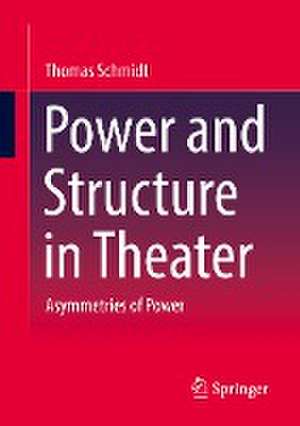Power and Structure in Theater: Asymmetries of Power
Autor Thomas Schmidten Limba Engleză Paperback – 31 oct 2023
The content
- Power as a decision-making and management tool in the theater
- The connection between power and organization
- Power and abuse in the theater
- Structural power and forms of power containment
- Results of the study
The target groups
- Students, teachers and researchers in the fields of cultural management, cultural and theater studies, dramaturgy, psychology, sociology and anthropology,
- employees of management at the theater and other cultural organization
Thomas Schmidt has been professor and director of the Theater and Orchestra Management program in Frankfurt since 2010. He was managing director of the National Theater Weimar from 2003 to 2013 and visiting professor at Harvard University in 2014.
Preț: 531.07 lei
Preț vechi: 624.79 lei
-15% Nou
Puncte Express: 797
Preț estimativ în valută:
101.62€ • 106.37$ • 84.58£
101.62€ • 106.37$ • 84.58£
Carte tipărită la comandă
Livrare economică 31 martie-14 aprilie
Preluare comenzi: 021 569.72.76
Specificații
ISBN-13: 9783658422790
ISBN-10: 3658422793
Pagini: 410
Ilustrații: XXIII, 410 p. 53 illus.
Dimensiuni: 148 x 210 mm
Greutate: 0.52 kg
Ediția:1st ed. 2023
Editura: Springer Fachmedien Wiesbaden
Colecția Springer
Locul publicării:Wiesbaden, Germany
ISBN-10: 3658422793
Pagini: 410
Ilustrații: XXIII, 410 p. 53 illus.
Dimensiuni: 148 x 210 mm
Greutate: 0.52 kg
Ediția:1st ed. 2023
Editura: Springer Fachmedien Wiesbaden
Colecția Springer
Locul publicării:Wiesbaden, Germany
Cuprins
Power as a political raw material - and as a decision-making and management tool at the theater.- The specifics of the German theater system.- Power and organization.- Power and abuse at the theater.- Results of the study at a glance.- Structural power and forms of power containment.
Notă biografică
Thomas Schmidt has been professor and director of the Theater and Orchestra Management program in Frankfurt since 2010. He was managing director of the National Theater Weimar from 2003 to 2013 and visiting professor at Harvard University in 2014.
Textul de pe ultima copertă
Structure and power are two defining and interrelated aspects of the German theater business. It is based on the strictly hierarchical organization of 1900 and has undergone hardly any structural changes since then. This not only impairs the innovative capacity of this important institution, but also leads to inappropriately strong power positions of the directors, to conflicts with the ensembles and employees, and hinders the development and renewal of the artistic potentials of this cultural technique. The publication is based on the results of the study 'Art and Power in the Theater' - with 1966 participants the largest study of its kind.
The content
Thomas Schmidt has been a professor and director of the Theater and Orchestra Management program in Frankfurt since 2010. He was managing director of the National Theater Weimar from 2003 to 2013 and visiting professor at Harvard University in 2014.
The translation was done with the help of artificial intelligence. A subsequent human revision was done primarily in terms of content.
The content
- Power as a decision-making and management tool in the theater
- The connection between power and organization
- Power and abuse in the theater
- Structural power and forms of power containment
- Results of the study
- Students, teachers and researchers in the fields of cultural management, cultural and theater studies, dramaturgy, psychology, sociology and anthropology,
- employees of management in theaters and other cultural organizations.
Thomas Schmidt has been a professor and director of the Theater and Orchestra Management program in Frankfurt since 2010. He was managing director of the National Theater Weimar from 2003 to 2013 and visiting professor at Harvard University in 2014.
The translation was done with the help of artificial intelligence. A subsequent human revision was done primarily in terms of content.
Caracteristici
First publication on structural conditions and power asymmetry in German theaters Large-scale study of power structures in theater Comprehensive solutions for a fair, diverse and sustainable theater landscape
